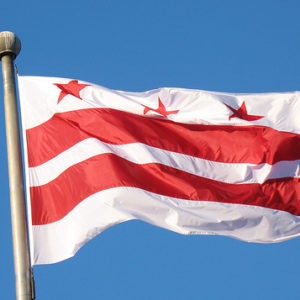For an alternate viewpoint, see: Counterpoint: D.C. Should Not Become a State. Ever.
Donald Trump took over the D.C. police force and deployed the National Guard under the pretense of “rescuing the nation’s capital from crime.”
Of course, masked officers roaming the streets and intimidating and harassing residents haven’t made the city feel safer. A checkpoint was set up just a few blocks from my home, with “traffic safety” offered as a pretext for ICE agents to arrest and detain immigrants. Nearby, vulnerable unhoused residents watched in vain as their belongings were bulldozed per the president’s orders.
Perhaps Trump’s takeover of Washington is intended to distract from his unpopular Medicaid cuts, weak job numbers, and the Epstein files. Maybe it’s another attempt to suppress blue cities led by Black mayors. Whatever it is, this despotic attempt to manufacture a crisis amid a steady decline in violent crime will do little to make D.C. safe.
It also demonstrates the urgent need for D.C. to become a state.
Trump’s authority to call up the local police force and D.C. National Guard on an emergency basis stems from the Home Rule Act of 1973. While home rule enabled Washington to elect its own mayor and city council, it preserved veto power for Congress over its laws and budget. It left the city susceptible to federal intervention.
While among the gravest threats to the city’s tenuous self-governance, Trump’s order is the latest in a long line of assaults.
Over the years, Congress has overturned or prevented the implementation of D.C. laws related to abortion access, marijuana legalization, needle exchanges and sentencing reforms. Last spring, House Republicans stripped $1 billion from the city’s approved budget, forcing cuts to programs that were already paid for with local tax dollars.
With no voting representation in the House or Senate — and only three votes in the Electoral College — the city has few ways to advance its interests or protect itself from harmful interference.
The solution is simple: Grant the city the same constitutional rights that citizens of other states enjoy. By redefining the federal district to encompass the downtown federal core, the remainder of the city can be admitted to the union as previous territories were.
Granting D.C.’s 700,000 residents (a population greater than Wyoming and Vermont) full and equal democratic representation corrects a historic wrong, and it’s what Washingtonians want. From its grassroots origins in the 1970s, the fight for statehood has grown increasingly popular, with 78 percent of residents expressing their support in a 2016 referendum.
Support for D.C. statehood has also grown on Capitol Hill. The House of Representatives passed the Washington D.C. Admission Act for the first time in 2020 in the aftermath of the George Floyd protests, illustrating the deep ties between the fight for D.C. statehood and the struggle for racial justice.
Indeed, racism has been a key stumbling block in the historically Black city’s quest for self-government and equal rights. The bill’s death in the Mitch McConnell-led Senate soon after revealed how racism and political motivations entwine, with Republicans nearly universally opposed to statehood on partisan grounds. (Some Democrats aren’t much better, with former West Virginia senator Joe Manchin dooming statehood’s chances under President Biden in 2021.)
While the statehood movement has flagged in the four years since, Trump’s aggressive moves have the potential to revive it. Outraged residents are taking to the streets, demanding a Free D.C. and finding creative ways to defend their neighbors.
Nationwide, people committed to combating authoritarianism are watching in horror while Trump treats the capital as his pawn. Support for D.C.’s right to determine its future must become part of that broader fight.
It’s the right thing to do, and it may be the only way to ensure our collective safety.


